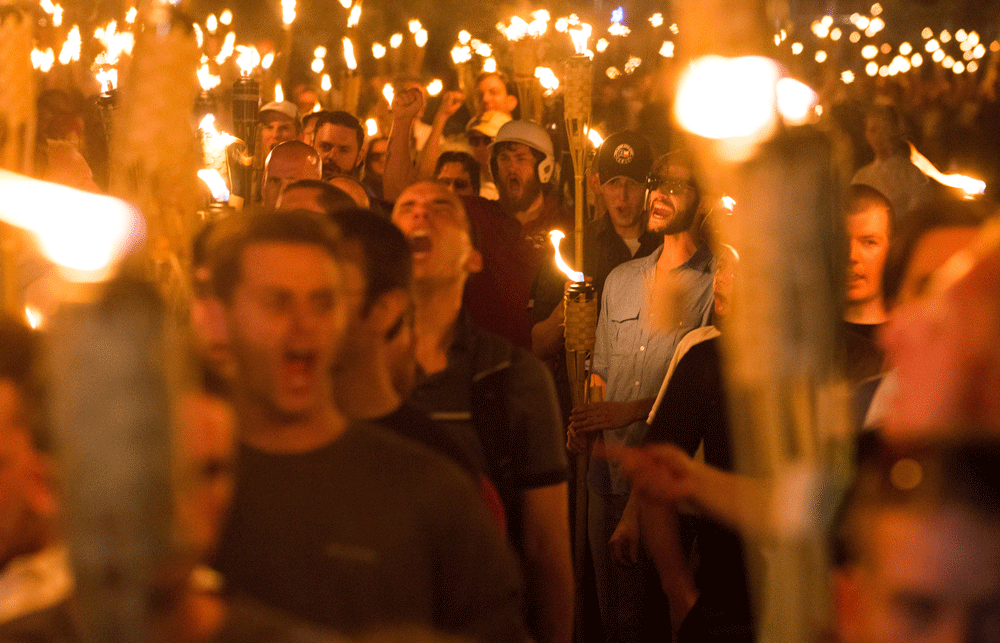
In the 1936 short story “The Devil and Daniel Webster,” the famous senator argues with Satan for a man’s soul. The devil agrees to Webster’s request that the case be tried before a judge and jury composed of Americans. Among the jury are such figures as the murderous Wampanoag King Philip and the pirate Blackbeard:
“One and all, they came into the room with the fires of hell still upon them, and the stranger named their names and their deeds as they came, till the tale of 12 was told. Yet the stranger had told the truth — they had all played a part in America.”
In the aftermath of riots in Charlottesville, Virginia, there has been a concerted effort by public figures to distance themselves from the white supremacist protesters opposed to the removal of a statue of Gen. Robert E. Lee. While that may seem agreeable at first, this line of thinking is harmful — we must confront the fact that Confederates, neo-Nazis and the “alt right” are indeed our countrymen.
They should be taken seriously. Not because their grievances are necessarily legitimate, but because they have a root cause worth addressing. Racist thought of course is a venerable tradition in America. That’s common knowledge; so much so that the public’s association of people like Lee with the Confederacy (and thus, Jim Crow and segregation) has overshadowed every other aspect of their history.
The more relevant question, then, is why do people still hold racist views today, and how can we convince them otherwise? Some would have us ban online accounts or deny protest permits, or even commit vandalism and assault — in other words, the methods of the censor and the stormtrooper. The problem with this reaction should be obvious.
Our unfortunate professor Ciccariello-Maher recently told The Triangle that “[y]ou cannot debate with fundamentally irrational ideas. … They’re Nazis because they want to have a faith, and you can’t break that faith except by out-organizing them and through making their movements impossible in the streets.”
He does not grant the same need for provocative organizing to his opponents. Nor did he realize that this legitimizes calls to fire him from people who think his own views are repugnant and irrational. No, a free republic requires a just respect for each citizen’s capacity for reason.
We must therefore address the origins of white supremacist beliefs. These are conjectured as economic decline in white communities, discomfort with changing demographics and a disaffection with government. An economic structure focused on giant multinational business, a shift away from familiar religions and languages, and a dysfunctional politics can easily be radicalized into a Jewish banker conspiracy, a threat to white culture and the need for violence. Simplifying a complex system of misbelief to mere “hate” impedes any progress.
One solution to radicalism is to decipher and address the real grievances. This has been done in Charleston, where leaders of the South Carolina Secessionist Party and a Black Lives Matter chapter recently came together on shared concerns like gentrification, and spoke about the need for peaceful dialog. An inclusive discussion builds the common bonds that defend against radicalism.
Yet more important is that there exists a deep internal contradiction among those Americans who distance themselves from the Charlottesville protesters. The group opposite to white supremacists is not those who are not racist — most people equally take for granted that our society is organized based on race.
The census categorizes people by race, employers are criticized or praised based on racial demographics, and in academia we find scholarships with explicit racial requirements. Popular language even trends toward creating a whole new race, the “Hispanic,” out of what was only a cultural notation. I don’t suppose that this means a feeling of white victimization is accurate, but it does pose a significant intellectual problem. This kinder, gentler racism is hardly an effective weapon..
White supremacism presents us with an ordered, logically consistent structure for society, based only on false premises. How can it be destroyed except with a complete and sound alternative? Our leaders still publicly aspire to the idea of mere racial “equality” rather than speaking of the abolition of race, that false division of our nation.
A just future cannot be one in which we simply strike racists from the record — ignoring our own flaws, and not inviting them to be part of a better society. That was how Webster won over the jury of the damned:
“He talked of the early days of America and the men who had made those days. It wasn’t a spread-eagle speech, but he made you see it. He admitted all the wrong that had ever been done. But he showed how, out of the wrong and the right, the suffering and the starvations, something new had come. And everybody had played a part in it, even the traitors.”

